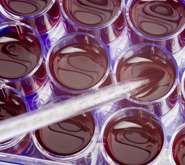Researchers reveal more effective way of testing therapies to treat depression

(Medical Xpress)—Researchers have found a new method for studying depression in rats that mirrors an aspect of the mood-related symptoms of the condition in humans. Until now, the lack of animal models that can replicate the emotional symptoms of psychiatric disorders displayed in humans has been a major obstacle for the development of treatments. It is hoped this new technique, published in Neuropsychopharmacology, will improve the efficacy testing of new therapies.
Research using animal models is key to developing new treatments for depression as well as finding out how and why some people don't respond fully to antidepressants—the most widely prescribed treatment for people with the condition.
Studies in people have recently revealed that depression changes the way a person perceives emotional information. These biases, termed emotional or affective biases, have also been shown to be modified by drug treatments which have efficacy in treating depression. Now, scientists at the University of Bristol have identified a new method of modelling a similar behaviour in rats and demonstrated that drugs which are antidepressant in man cause positive biases in this rat task. Importantly, the team have also shown that drugs which can cause depression in people cause a negative mood using our new technique.
The positive and negative affective biases induced by the drugs tested in this study mirror the antidepressant and pro-depressant effects of the same treatments in patients. This means that this new method can be used to better predict how drugs which are being developed to treat patients may affect emotional behaviour.
The results also provide some preliminary evidence which suggests that affective biases could contribute to drug or stress-induced mood changes in people and support the hypothesis that psychological processes may be involved in how depression develops and how antidepressant drugs act to improve symptoms.
The findings have established a new way of testing for anti-depressant treatments in humans as well as helping to predict if a drug is likely to cause mood-related side effects.
Dr Emma Robinson, the study's lead author and a Senior Lecturer in the University's School of Physiology and Pharmacology, said: "More that 20 per cent of the population in Britain is likely to experience at least one episode of depression during their lifetime. The challenge that scientists have been faced with is to understand how and why these current treatments work in some people but not others and also how new treatments could be made which work much more quickly. To achieve this and to better predict if a drug will work in people, improved methods in animal models were essential.
"Our results also looked at stress and social support using this models which may provide new insight into potential triggers that cause depression and methods to improve its treatment. Ultimately, this new method will pave the way for more effective drugs."
More information: Butler, P. et al. Affective biases in depression and antidepressant therapy, Neuropsychopharmacology. www.nature.com/npp/journal/vao … /abs/npp201369a.html














